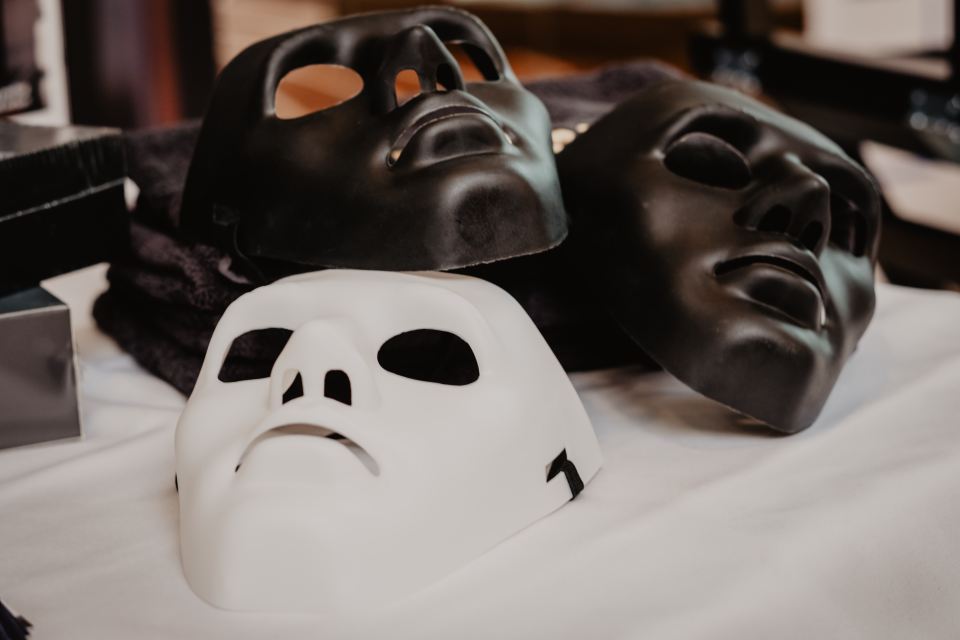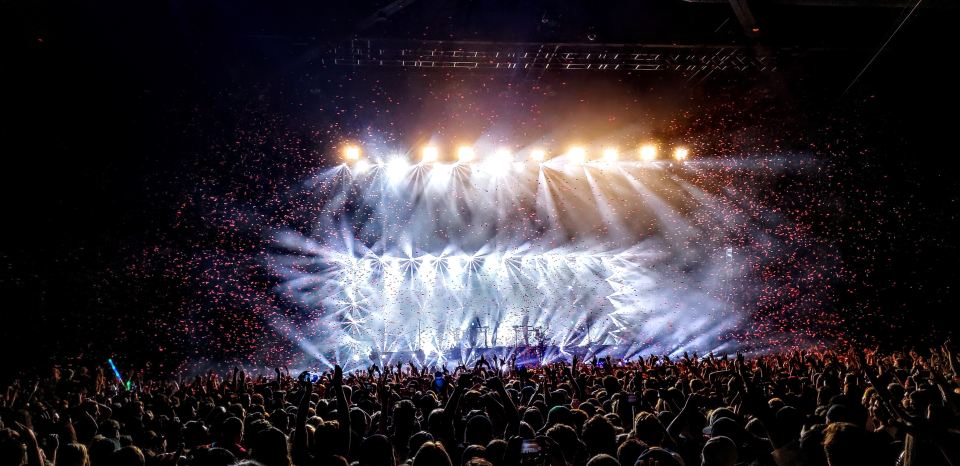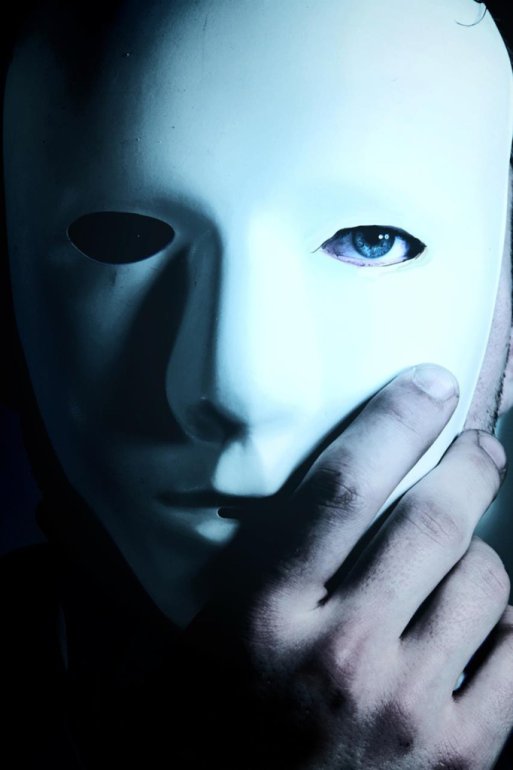Is It Really You? – The Masks We Wear and 10 Questions You Can Ask Yourself

All of us wear masks.
The professional self we use at work, or to talk with our clients.
The sweet-talking parent we use with our three year old
The always dependable friend who’s everyone’s support post
The perfect self-help guru who needs to set an example
The sensible teacher
The brand-name rich guy
The party-goer
A mask is something we wear to suit the situation we’re in and it’s natural to switch from one to the other depending on the situation.
For example, the professional CEO would , perhaps, switch to family mode when getting home.
The sweet-talking parent might become foul mouthed in front of friends, once the child is out of earshot.
The sensible teacher might get home and start planning their crazy stag night out.
Masks help us to adapt.
The problem starts when we forget who we really are beneath, when we construct them purely to cover up parts of ourselves we don’t like, or when we use them purely to fit into a crowd that doesn’t match our true values. I will refer to these masks as ‘theatrical masks’.
These days, with social media, it’s easier than ever to project the image of a perfect life, while leaving out all the crazy or mundane.
You can show people only what they want to see, write only what people want to read.
It’s easy to pretend you’re somebody else.
Carl Jung spoke about the unwanted parts of ourselves as ‘the shadow’. The parts of ourselves we don’t like to acknowledge but are there whether you like it or not.
We often construct masks to relieve that discomfort, or to appear a certain way in order to find acceptance – something all people strive for.
Sometimes, we’re aware of using these kinds of masks, almost as if we’re performing on a stage, but most of the time, we don’t even realise it.

We think we’re a party animal, but we’re not. We think we’re thrill-seekers, but we’re not.
We can wear masks for so long that not only do we forget who we are, it slowly becomes a part of who we are. That can be a terribly destructive thing, but not always.
For example, as a teenager and young adult I used to be wallowing in depression and self-pity, but would pretend to be hyperactive, silly, and fun-loving. That way, I would surely make and keep friends.
Now, it certainly got me friends, and after a while, I noticed that I was no longer pretending – I really had become more energetic and fun-loving, and I was no longer depressed. It was a classic case of ‘fake it to make it’.
But that’s not always the case, and quite often, the theatrical masks we use to escape from parts of ourselves only serve as a constant drain of precious mental and emotional energy.
Celebrities are under a lot of pressure to project a certain image, and thus the true self can end up totally lost or destroyed and lead to substance abuse or breakdowns.
Imagine what it would be like to be constantly practising lines, ready to perform in front of thousands of people, day in, day out, without a break, whether you’re a celebrity or a student.
Contrary to what many think, it’s a hundred times more exhausting to maintain a mask, than using the courage to just be ourselves.
Left unchecked, a theatrical mask can cause serious mental health and relationship problems as we are constantly at war within ourselves.
Marketers promote the use of masks all the time – they convince you that if you buy their product you can appear a certain way (strengthen the mask you show to the world).
There’s constant pressure in society, as well, to be or look a certain way.
Wear celebrity-endorsed fashion, become rich, have two kids, become a CEO, own the latest iphone, keep climbing the usual career ladder, don’t think outside the box, don’t break the mold, don’t be exceptional.
People who do break the mold, start walking their own path, and being their authentic selves often face a lot of backlash and confusion, often from people who are busy maintaining their own masks and are concerned that you have pulled off yours.

Someone who quits their job to run their own business, for example, might encounter a lot of “You’re mad”, “that’s wrong”, that’ll never work.”
Minimalists might encounter others who laugh at their way of life.
Authors might encounter people who shake their head and tell them to get a real job.
But people who laugh at or discourage others from being their best authentic selves, are most likely wearing their own masks and are disturbed to see others break free from the stifling need to keep thoughts and dreams, as just that.
After all, it’s utterly terrifying to be directly confronted with another truth or way of life, when you don’t know yourself, or are suddenly forced to ask yourself uncomfortable questions.
Most would rather project their worry and pain onto the person in question, rather than confront and discover themselves.
Sooner than asking things like, “If this is possible, then what have I been doing for the past twenty years?”, it’s much easier to try to pull the other person back into the circle of what is ‘known and acceptable’, or to make them start doubting themselves.
Confronting yourself is hard. It’s petrifying. It can be paralysing.
To check whether you’re wearing a mask right now, you should make a habit of asking yourself these questions:
What is my dream?
Is what I’m doing contributing to that?
What’s my opinion on (insert topic here)?
Do my words match my beliefs?
Do I speak the truth, or do I fear hurting or angering others?
Why am I doing what I’m doing?
How do I act around my friends?
Is that true to how I really feel?
How do I act around my significant other?
Is that true to how I feel inside?
Asking such questions can be uncomfortable, but can bring a lot of clarity and save you a lot of energy from fake performances.
Being authentic can lead to true happiness and a sense of wellbeing that performing never can.
Just recently, I discovered I was wearing my own mask without even knowing.
I used to have anger issues, but over time, in my quest to become a better person, I became the opposite.
I became complacent and started covering up my true thoughts and feelings. Being overly nice to people when I felt like ripping into them. Playing the videogame platforms that the people around me said was for ‘true gamers’.
Somehow, I had discarded one damaging mask, only to put on another damaging one.
I was only alerted to the mask I had been wearing, when I almost had a mini-breakdown the other week.
Someone had upset me and made me feel very small. I recognised what they were doing was a classic power play technique, but instead of sticking up for myself, I made a joke out of it.
Instead of having my mini breakdown, I sat and wrote for hours. Pages and pages. And it was amazing the things I was doing simply to please others and ‘not hurt or anger’ others.
To be accepted and liked, I would let people walk all over me, laugh at me, and control my likes. All without me being aware.
I was pretending to be an avid PC gamer, all while deep down I prefer to play on consoles and earn the satisfying ding of achievements. Then I was wondering why I rarely played any of my games.
I was covering up my real thoughts and feelings and acting like a mouse, all while the me inside was screaming and raging.
I can’t tell you when the mask started, because it was more of a gradual construction, but from that moment on, I decided to start being more authentic.
That started by telling someone close to me exactly how pissed I was with them when they were making me feel insignificant. And didn’t sugarcoat it.
To my surprise, they quickly stopped. In that moment, I had self-respect, and I earned respect.
It’s easy to forget how liberating it feels to say what you’re really thinking. It was as if a huge weight had been lifted off my shoulders.
Also, I went back to mainly gaming on consoles, and using my PC only for the most power-hungry games and The Sims. I felt so much happier.
Masks can be useful, but they can also be a major hindrance.
They can help you to get that promotion, and they can cause you to become drained and depressed.
They can support you or they can weigh you down.
What type of mask are you wearing?




